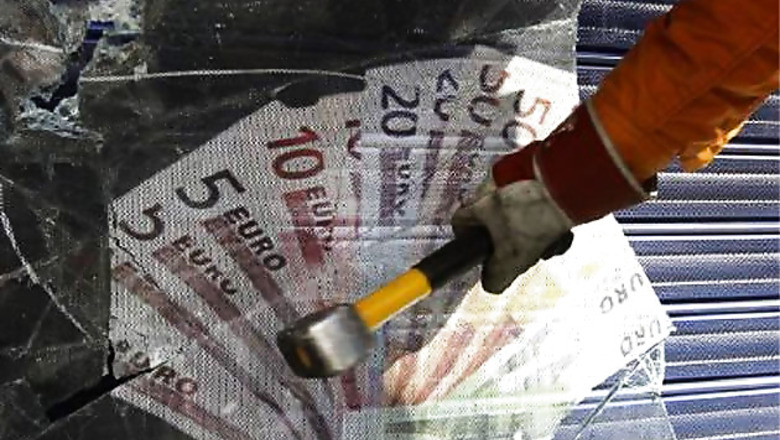
views
New Delhi: The Greek tragedy continued to sink markets across the world. The euro plunged to a 4-month low after Greece failed to form a coalition government and a fresh round of elections is in the offing. Analysts say US markets are bracing themselves for the worst. Stock markets fell on worries that Greece would exit the euro bloc and throw the global markets into further turmoil. New elections were called in Greece for June 17 after coalition talks to form a government fell apart.
The Dow Jones industrial average fell for the ninth day out of 10, and gold, oil, and the euro all dropped to multi-month lows.
The Greek President said depositors were pulling hundreds of millions of euros out of banks, weakening the country's strained financial system. The main cause for investor worry was that Greece would pull out of the group of countries that use the euro, and that that would throw the global markets into chaos.
For US stocks, it was a fairly quiet day on Wednesday, but another decline in a month that has been relentlessly downbeat. The Dow fell 33.45 points to 12,598.55, and the Standard & Poor's 500 index fell 5.86 points to 1,324.80.
Indian markets also reflected the grim mood after the rupee slumped to a record low against the dollar on Wednesday as the global risk aversion added pressure on a currency already under fire from the country's current account and fiscal deficits.
The rupee, the worst performing emerging market currency in Asia since March 1, is facing further losses as India struggles with a slew of additional economic challenges, including sliding growth.
Investors are also showing little faith in the government's ability to meet its fiscal targets and solve its economic challenges, critical stumbling blocks for a country that needs the capital to shore up its twin deficits.
Finance Minister Pranab Mukherjee pledged on Wednesday to take action to boost "fiscal consolidation", but said no measures had been worked out, reinforcing these market concerns.
The worries about India's outlook are overwhelming the Reserve Bank of India's ability to defend the local currency, despite repeated interventions and a rash of other measures targeting deposits and exporters.
"It is very hard for the central bank to turn the currency around," said Robert Prior-Wandesforde, an economist for Credit Suisse in Singapore.
"Without doubt, the investors are looking for steps from the government in terms of structural reforms, be it in the form of news on goods and services tax or the direct tax code or some measures that might encourage infrastructure investments."
The rupee fell to a record low of 54.52 to the dollar, well below its previous record low of 54.30 hit in December.
Analysts expect the rupee, which ended trade at 54.51, to remain under pressure, given the continued concerns that Greece may pull out of the euro zone and the challenges at home.
A report showed analysts expect the rupee to hover near record lows against the dollar for the next month or so, despite already falling nearly 10 percent since its 2012 peak in February.
"Unfortunately for the rupee, this is not a great environment to run a current account deficit and thus be reliant on capital inflows from foreign lenders," said Sean Callow, a senior currency strategist at Westpac Banking Corp in Sydney.
"I suspect only radical steps by RBI - or sudden action by foreign central banks and/or G20 - will stop a push through 55 and quite possible higher," he said, referring to the dollar/rupee exchange rate.
Many analysts blame the start of the rupee's fall on the budget for fiscal 2013 unveiled in mid-March, which proposed a deficit target of 5.1 per cent of gross domestic product that generated market scepticism.
The government also included a controversial set of taxation proposals for foreign investors.
Capital flows into Indian debt and equities turned negative in April, with a net $926.8 million leaving the country, down from a peak of $7.2 billion in net purchases in February.
Mukherjee's promise of austerity measures on Wednesday failed to convince investors, especially as policy making is expected to stall in the run-up to general elections in 2014.
"The government has been only talking about fiscal consolidation but there are no steps at all, nothing being done to reduce the fiscal deficit," said Rupa Rege Nitsure, chief economist at Bank of Baroda.
The RBI thus faces a steep battle in defending the currency, even as a weaker rupee threatens to push up inflation, though traders say they do not rule out more aggressive actions.
"The RBI is aware of the situation. We have taken steps and will take further steps if necessary," said RBI deputy governor HR Khan at the sidelines of a summit of South Asian Association for Regional Cooperation in Nepal.
Liquidity would be a concern, though the central bank is expected to step up bond purchases via open market operations should it sell dollars more aggressively in markets.
(With additional inputs from Reuters, AP)
















Comments
0 comment